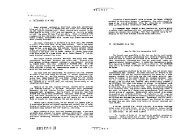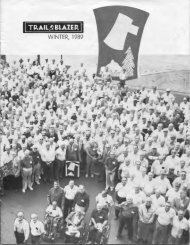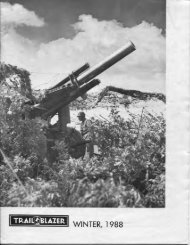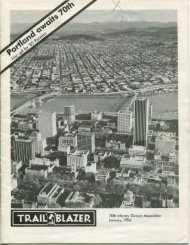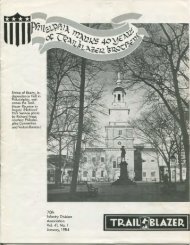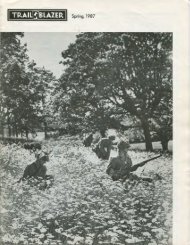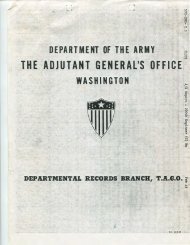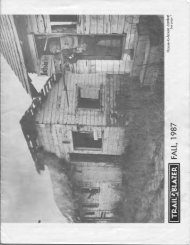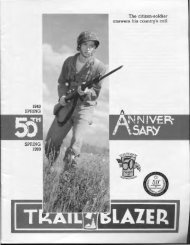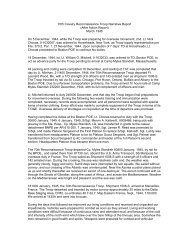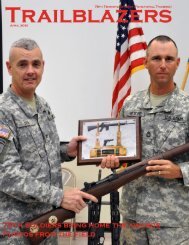Download - 70th Infantry Division Association
Download - 70th Infantry Division Association
Download - 70th Infantry Division Association
Create successful ePaper yourself
Turn your PDF publications into a flip-book with our unique Google optimized e-Paper software.
ashore. Captain Michaels got in front of everybody and lined up four platoons on the beach. He said<br />
something like "Sergeant, we are all here and we are all accounted for."<br />
They moved us through Marseilles on. the back of semi-trucks, like cattle. It was dark and they took us to<br />
Delta Base Section Command Post No. 2, which if I remember right was called "Lucky Strike". It was<br />
nothing but mud and snow-covered hills with no toilets, only pit latrines and trench latrines, and no<br />
buildings. We pitched pup tents on top of the hill and spent December 16 to December 23 getting ready<br />
for the Front Line.<br />
We took our equipment and detail stripped it. I was in a 60-mm motor section and we were issued<br />
backboards with the intent of strapping the mortar and the base plate on the backboards and carrying that<br />
plus your personal equipment. While we were there, we would adjust, fix, correct, throw away, find new,<br />
change, reorient anything possible to make it easier. We made our bed rolls and were issued gas masks.<br />
Orientation instruction was conducted by company at CP No. 2 to familiarize the men with the strategic<br />
situation on the Western Front. Troops were granted occasional passes for a few hours at a time (always<br />
daylight) in the city of Marseilles. V-Mail stationery was issued and a few consignments of mail from the<br />
States arrived and were distributed. The Retreat Ceremony was conducted nightly in the bivouac.<br />
Company officers stressed military courtesy and discipline in their instructions to the men during this<br />
period.<br />
Weather during the stay in the Marseilles vicinity was rainy and cold and the bivouac area was muddy.<br />
Movement of the 276th <strong>Infantry</strong> to the combat area began early in the morning of 23 December 1944. The<br />
foot elements were transported in two troop. trains, composed of French freight cars, which left before<br />
noon of 23 December 1944. The first was commanded by Major Theodore R. Mataxis and the second by<br />
Major Robert J. Natzel.<br />
Each of these trains was unloaded at Brumath, France, and the troops marched to Bischwiller, France,<br />
where they were billeted in abandoned factories and public buildings.<br />
Meanwhile, the motor elements of the Regiment began their northward movement from CP No. 2 at 0630<br />
on 24 December 1944. The motor column bivouaced that night in St. Rambert, France, having covered<br />
176 miles. The night of 25 December the bivouac was in Dijon, France, after 167 miles, and on 26<br />
December 1944 the motor elements drove 145 miles, bivouacking in Baccarat, France.<br />
The motor column cleared into its billeting areas in Bischwiller at 1630 on 27 December 1944. after a 113<br />
mile drive the last day.<br />
From 27 December 1944 to noon of 29 December, the 276th <strong>Infantry</strong> remained in Bischwiller in<br />
TF HERREN reserve. During this period the Regimental strength was 152 officer-s, 5 warrant<br />
officers, and 2805 enlisted men. A total of 219 EM had been transferred as replacements to the<br />
80th <strong>Infantry</strong> <strong>Division</strong>. The supply situation was: Rations, 3 days rations; ammunition, basic load;<br />
all unserviceable signal equipment was ordered to repair section the Commanding General; gas<br />
and oil, 1 day supply.<br />
We departed Delta Base Section Command Post No. 2 at 5:00 by rail enroute to a new station.<br />
We marched down the road in the mud and snow to the railway and boarded 48 World War I box<br />
cars. At that time we had no problem with our equipment because it was a short walk, less than a<br />
mile. We got on the 48 box cars and proceeded to move north. The equipment did not seem<br />
cumbersome and we were fully loaded. We had excess ammunition, excess water, excess<br />
everything. We carried brand new equipment, brand new overcoats, brand new shoe packs,<br />
brand new rifles. We were a brand new outfit.<br />
From December 23 to December 25, we moved by rail and we arrived at Bischwiller, France, at<br />
2300 with 190 enlisted men and 6 officers. On Christmas Eve, we were proceeding on the 48 box<br />
cars, each car built to take 40 enlisted men and eight horses. We had a platoon in each box car,



